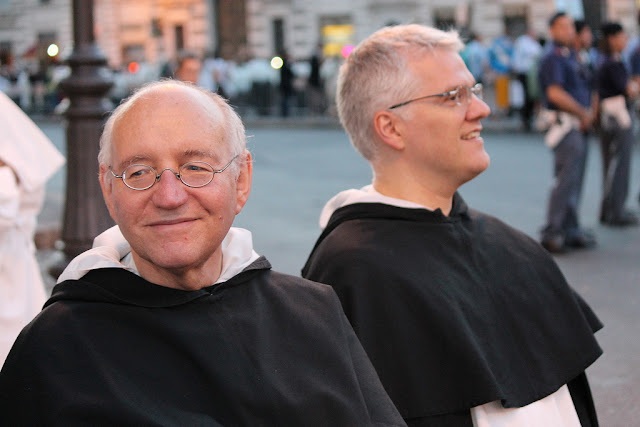Fr. Philip Neri Powell, OP
St. Dominic Church, NOLA
Back in the 90's—my grad school days—a popular theme developed among social and literary theorists: the rise of “panic culture.” Innovative technology was evolving so fast that theorists imagined us to be a nation on the verge of a nervous breakdown! Unable to keep up with the dizzying changes in the rules of the game, we were running ourselves ragged in a panic just to survive. While simultaneously gulping venti espressos and calming herbal teas, we watched Prozac start the psychotropic medications revolution. Our despair became a mental illness rather than a spiritual deficit. Drug abuse, addictions, sexual experimentation, and extremist identity-politics were just the side effects of our national panic. If your life wasn't swirling in chaos, you weren't adapting; and if you weren't adapting, your were dying. Having rejected the ordering principles of right reason and legit moral authority, we were left with nothing but our unfettered passions and our socially constructed truths. No one stopped to ask the one question that might've focused our panic and calmed it: “Can you add a single moment to your life-span by worrying?” No. So, seek first the Kingdom of God and his righteousness.
What causes us to worry? In his book, The Face of God, Roger Scruton describes the scientific worldview, “We are by-products of a process that is entirely indifferent to our well-being, machines developed by our genetic material and adapted by natural selection to the task of propagation”(2). According to the evangelical atheists who preach materialist science as religious dogma, we are nothing more than “survival machines in the service of our genes”(2). If this is true, or if we believe it to be true, then our panic is more than justified; it's a natural survival response to a chaotic environment. But if the worldview that Scruton describes is false, or only a part of the truth, then our cultural anxiety betrays an astonishing lack of faith in not only our own ability to survive as moral creatures but also in God's providential care for us. Jesus goes straight to the heart of the problem when he asks, “Can you add a single moment to your life-span by worrying?” Why are you worrying about food, drink, clothes? “All these things the pagans seek,” he says. “Your heavenly Father knows that you need them all. But seek first the Kingdom of God and his righteousness. . .”
We are not by-products of a process that is entirely indifferent to our well-being. We are loved creatures created by a loving Creator who built into our genes a desire to seek Him out and live according to His love. If you choose to live your life as a day-to-day struggle to survive in order to pass on your genes, then worry is an excellent survival skill. Fear will increase your chances of survival by making you averse to taking dangerous risks. However, if you choose to live your life as a day-to-day quest for righteousness, then worry is a deadly affliction. Fear will rot your trust in God and encourage you to gather earthly treasures as insurance against God's possible failures. If the god you worship can fail, then he/she is unworthy of your worship. Why attach yourself to a deity, an idol that can falter? And more importantly, why lay claim to the name Child of God if you have no intention of trusting in His loving-care? We cannot serve God the Father and our worry. Two masters of a single soul leaves that soul confused, chaotic, panicked. Seek the Kingdom and God's righteousness, and abandon all your anxieties. They are parasites, deadly distractions from your quest. Leave tomorrow to take care of itself. And God the Father will take care of you.
Follow HancAquam and visit the Kindle Wish List and the Books & Things Wish List
Click on St. Martin and donate to the Dominicans! ----->


